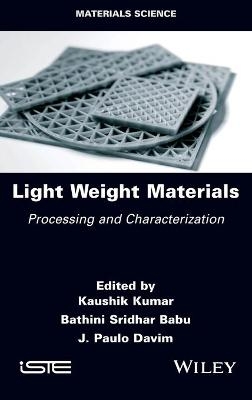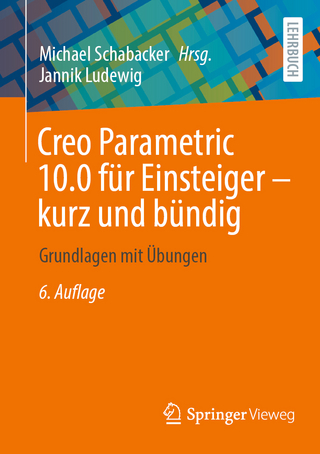
Light Weight Materials
ISTE Ltd and John Wiley & Sons Inc (Verlag)
978-1-78630-797-2 (ISBN)
This book provides researchers and students with an overview of the recent advancements in light weight material processing, manufacturing and characterization. It contains chapters by eminent researchers on topics associated with light weight materials, including on the current buzzword “composite materials”. First, this book describes the current status of light weight materials. Then, it studies applications of these materials, given that, as the densities vary, so do the applications, ranging from automobiles and aviation to bio-mechatronics. This book will therefore serve as an excellent guide to this field.
Kaushik Kumar is Associate Professor at the Birla Institute of Technology, India. He has many years of industrial experience and his research interests include composites, optimization, non-conventional machining and quality management systems. Bathini Sridhar Babu is Professor and Dean of the IIIIC at the CMR Institute of Technology, India. His research interests include manufacturing, advanced materials and mechanics of materials, among others. J. Paulo Davim is Full Professor at the University of Aveiro, Portugal, and a Fellow (FIET) of The Institution of Engineering and Technology, UK. His research interests include manufacturing, materials and mechanical and industrial engineering, with a special emphasis on machining and tribology.
Preface xi
Part 1 Manufacturing Processing Techniques 1
Chapter 1 Additive Manufacturing: Technology, Materials and Applications in Aerospace 3
Veeman DHINAKARAN, Mahesh VARSHA SHREE, Thimmaiah JAGADEESHA and
Madabushi SWAPNA SAI
1.1 Introduction 4
1.2 Additive manufacturing configuration 5
1.3 Classification of AM technology 6
1.3.1 Laser beam melting 6
1.3.2 Electron beam melting 7
1.3.3 Selective laser melting 8
1.3.4 Direct metal laser sintering 9
1.3.5 Laser metal fusion 10
1.3.6 Direct metal deposition 11
1.4 Materials used in AM technology 12
1.4.1 Titanium and its alloys 13
1.4.2 Inconel 13
1.4.3 Aluminum 14
1.4.4 Stainless steel 15
1.5 Aerospace applications of additive manufacturing 15
1.6 Challenges faced in the aerospace industry 17
1.7 Overcoming aerospace challenges with AM 17
1.8 Future work 17
1.9 Conclusion 18
1.10 References 18
1.11 Key terms and definitions 21
Chapter 2 Study of the Manufacturing Process of Polymer Spur Gears: A Light Weight Gear Material 23
Jitendra Kumar KATIYAR and Hemalata JENA
2.1 Introduction 23
2.2 Gear manufacturing process 25
2.2.1 Gear hobbing machine 26
2.2.2 Injection molding 27
2.3 Additive manufacturing/rapid prototyping 31
2.4 Laser ablation 32
2.5 Hot embossing 33
2.6 Conclusion 34
2.7 References 35
Chapter 3 Recent Trends in Welding Polymers and Polymer–Metal Hybrid Structures 39
Jinesh Kumar JAIN and Pankaj SONIA
3.1 Introduction 40
3.2 Polymer and composites 41
3.3 Polymerization 42
3.4 Synthesis of polymer composites 45
3.5 Types of fillers in composites 48
3.5.1 Effect of reinforcement orientation 51
3.6 Welding polymers 51
3.7 Introduction of lightweight metal and alloys 53
3.7.1 Magnesium alloys 53
3.7.2 Aluminum alloys 59
3.8 Welding dissimilar metal alloys 61
3.8.1 Friction stir welding 61
3.8.2 Welding polymer and metal alloys 62
3.9 Industrial application of polymers 64
3.10 Conclusion 66
3.11 References 67
Part 2 Characterization 73
Chapter 4 Preparation and Characterization of a Composite Material Using Sisal fibers for Light Body Vehicles 75
Zewdie ALEMAYEHU, Ramesh Babu NALLAMOTHU, Mekonnen LİBEN,
Seshu Kishan NALLAMOTHU and Anantha Kamal NALLAMOTHU
4.1 Introduction 76
4.1.1 Statement of the problem 76
4.1.2 General objective 77
4.1.3 Specific objectives 77
4.1.4 Significance of the study 77
4.2 Literature review 78
4.2.1 Introduction 78
4.2.2 Previous works on natural fiber polymer composites 78
4.3 Materials and methods 79
4.3.1 Sample preparation methods 80
4.4 Results and discussion 90
4.4.1 Experimental results 90
4.4.2 Observation 103
4.5 Comparison of previous works 106
4.5.1 Tensile strength 106
4.5.2 Bending strength 106
4.6 Conclusion and recommendation 107
4.6.1 Recommendations for prospective applications 108
4.6.2 Scope for future work 108
4.7 References 109
Chapter 5 Optimizing the Polystyrene Catalytic Cracking Process Using Response Surface Methodology 111
Selvaganapathy THAMBIYAPILLAI, Muthuvelayudham RAMANUJAM
and Jayakumar MANI
5.1 Introduction 112
5.2 Material and methods 114
5.2.1 Materials 114
5.2.2 Experimental procedure and characterization 116
5.2.3 Design of catalytic cracking experiment using response surface methodology 118
5.3 Results and discussion 119
5.3.1 Thermal analysis of polystyrene 119
5.3.2 SEM-EDX analysis 120
5.3.3 Model development for catalytic cracking of polystyrene 124
5.3.4 Combined effect of process parameters on the response (Y) 128
5.3.5 Characterization of liquid yield 133
5.3.6 Factors affecting catalytic cracking of polystyrene 136
5.4 Conclusion 139
5.5 References 140
Part 3 Analysis 143
Chapter 6 FEA Comparative Studies on Heat Flux and Thermal Stress Analysis during Conduction Mode and Keyhole Mode in the Laser Beam Welding 145
Harinadh VEMANABOINA, Suresh AKELLA and Ramesh Kumar BUDDU
6.1 Introduction 145
6.2 Heat in laser welding 146
6.3 Modeling 148
6.4 Results and discussion 149
6.4.1 Keyhole model 149
6.4.2 Conduction model 152
6.5 Conclusion 155
6.6 References 156
Chapter 7 Effect of Formability Parameters on Tailor-Welded Blanks of Light Weight Materials 159
Dappu DEEPIKA, Akkireddy Anitha LAKSHMI, Tanya BUDDI and Chalamalasetti
Srinivas RAO
7.1 Introduction 159
7.2 Experimental procedure 161
7.3 Results and discussion 169
7.4 Conclusion 189
7.5 References 192
Chapter 8 Design and Analysis of Sedan Car B-pillar Outer Panel Using Abirbara with S-glass Fiber Hybrid Composites 197
Ramesh Babu NALLAMOTHU, Melkamu Yigrem YIHUNIE, Anantha Kamal
NALLAMOTHU and Seshu Kishan NALLAMOTHU
8.1 Introduction 198
8.2 Materials and methods 202
8.2.1 Materials 202
8.2.2 Methods 206
8.3 Composite preparation, testing and analysis 207
8.3.1 Composite preparation 207
8.3.2 Testing and analysis 210
8.4 Design analysis of the B-pillar panel 214
8.5 Conclusion 219
8.6 Recommendations 220
8.7 Acknowledgments 220
8.8 References 221
List of Authors 223
Index 227
| Erscheinungsdatum | 25.01.2022 |
|---|---|
| Verlagsort | London |
| Sprache | englisch |
| Maße | 156 x 234 mm |
| Gewicht | 538 g |
| Themenwelt | Technik ► Maschinenbau |
| ISBN-10 | 1-78630-797-9 / 1786307979 |
| ISBN-13 | 978-1-78630-797-2 / 9781786307972 |
| Zustand | Neuware |
| Informationen gemäß Produktsicherheitsverordnung (GPSR) | |
| Haben Sie eine Frage zum Produkt? |
aus dem Bereich


